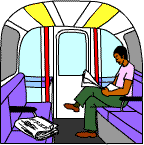The British Train Experience
Created | Updated Jan 28, 2002

When people say that you should be eco-friendly and travel using public transport, they have obviousaly not experienced the service of the British trains. This entry will try to explain why there are problems with trains in Britain and how to cope when you encounter them.
The Service...
Ever since the railways were privatised problems have arisen. Trains have become later, delays more frequent and accidents more common. This is due to several different companies all running on a shared track network. Railtrack is responsible for maintaining the track network and has come under a lot of fire recently due to the increased number of accidents. The track was in a bad state and was mainly responsible for the numerous accidents. Railtrack set a repair program that meant trains followed a restricted speed limit, which caused late, delayed and even cancelled trains. These problems are still in the system and they will take some time to flush out.
Who Run the Trains?The railways were nationalised in 1948 and then were privatised in 1993. Railtrack is responsible for the track maintenance. Before the privitisation all the trains were run by British Rail, they have now been subsequrntly divided into numerous companies:
| Company Name | Area |
|---|---|
| Anglia Railways | East Anglia |
| Arriva Trains - Merseyside | Merseyside |
| Arriva Trains Northern | North England |
| C2C | London |
| Central Trains | The Midlands |
| Chiltern Railway Co. | North London |
| Connex | South East England |
| First Great Eastern | East Coast |
| First Great Western | South Wales and Devon |
| First North Western | Manchester |
| Gatwick Express | London |
| GNER | London - Scotland |
| Hull Trains | East England |
| Island Line | Isle of Wight |
| Midland Mainline | The Midlands |
| ScottRail RAilways | Scotland |
| Silverlink Train Services | The Midlands - London |
| South West Trains | South West England |
| Thameslink Rail | Bedford - South Coast Replaced the old 'Bedpan Line' |
| Thames Trains | Central and South London and Thames Valley |
| Valley Lines | Bristol and Wales |
| Virgin Trains | All England |
| WAGN Railway | East England |
| Wales and West | Wales and the West Coast |
The Experience
This section will try to inform people of how to cope with a train journey in Britain, it has two main sections. Use these to help you plan as relaxed a journey as possible.
Games to Play...
There are a number of factors to consider when taking a game on the train, it must be:
- Easy to pack
- Not too long
- Easy to play (Even on a large, unsteady table)
- Easy to pick up quickly
The most suitable games to play are either card games, electronic games or board games. *
What to Pack...
Packing for the train is always a problem, you must try to anticipate all eventualities*, while at the same time not weighing yourself down with heavy items that are not necessary. This list should help you pack all the necessary items for a simple journey:
- An extra jumper in winter or suncream and a hat in summer.
- A snack and emergency food.
- A torch (Kept in an outside pocket, so it can be found easily).
- Medicines and tablets if they are prescribed.
- A pair of slip-on shoes.
Following this list will hopefully give you the peace of mind that you have packed for any likely happenings. You may of course wish to take additional items such as a camera and film or walkmans etc.
The Golden Rules...There are 2 golden rules to remember when travelling using a British train. They are:
- Always plan a contingent route, either using the train or an entirely different mode of transport, in case your train is badly delayed or cancelled.
- Never lose your temper with the ticket collecter or other members of staff. It is not their fault and they cannot help it. Calmly ask for a complaints form at the desk and fill it out. You will then direct you annoyance to the right people who can sort it out.
There used to be an intercity service from Bedford to St. Pancras London - it was affectionally known as the 'Bedpan Line'
Fact Contributed by Orcus
